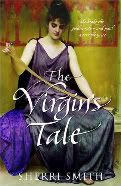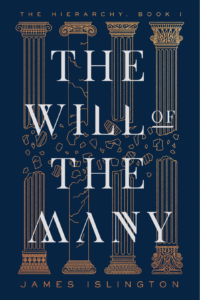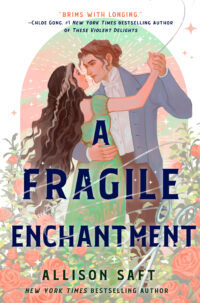Review : The Virgin’s Tale

The Virgin’s Tale by Sherri Smith
Pages : 420
Genre : historical fiction
My Rating : ![]()
As every reader does, my interests besides books are varied; along with art history, I am incredibly interested in ancient history, mythology and religions. It is even better when the subjects meet in one work of art, especially if they do so in a book, as it is the case here in The Virgin’s Tale. Having been curious about the vestals for a while, I couldn’t stay away from this one for long! From the back of the book :
Rome, 63 B.C. Offered up by her parents at the age of six to become a Vestal Virgin, one of six hand-picked women who symbolically protected the Roman Republic, Aemilia has spent her entire adult life in the all-female Temple of Vesta, under the strictest guard.
But temptation has led her to commit a mortal sin, and she is sentenced to death as Virgins must die, buried alive in a pitch-black tomb. As the end draws near, Aemilia looks back over her claustrophobic, restricted life: the intense friendships she formed; the implacable enemies she made; and , finally, the passionate but forbidden romance which caused her downfall – and yet may be her only hope…
Unlike what the book’s description suggest, The Virgin’s Tale isn’t, mostly, about a love story. There is some romance, yes, but it happens only in the second half of the book and without taking over completely. Meanwhile, we follow the tale of Aemelia’s life, from the day she was chosen to enter the Vestals’ house to her end in the tomb. The story is interrupted by brief glimpses of her present, burried alive in the dark, thus keeping in the reader’s mind the terrible faith that is awaiting her.
The pace of the story is slow – not to be mistaken with boring – and suits perfectly Aemelia’s life as a vestal. It takes talent as a writer to be able to describe the details of a life of routine, a life where the day repeats itself on and on, and still make it interesting to the reader, but Smith accomplishes that with success. Her Aemelia felt real and I could relate to her easily, even though there is a 2000 years gap between us. She was intelligent and curious, qualities that certainly weren’t encouraged as a vestal, but it made her all the more interesting to the reader.
Another great thing about The Virgin’s Tale was the author’s ability to make a realistic portrait of her character’s life. I felt I was in Rome, watching the games or keeping an eye on Vesta’s fire. You can read this novel without having a great knowledge of ancient Rome, and Smith is good at putting the facts in the story without it being like a history lesson. One of the historical details I appreciated the most were the appearences of Ceasar, Cicero and Anthony, who acted more like “guest stars” than anything else. It was nice to hear from them without the story being all about them for once!
I could go on and on about this book. I loved it so much it took me less than two days to finish it, and I wished it could have been longer! Smith did an incredible job of recreating what the life of a vestal could have been. I thought her writing was sometimes a little “over the top”, the metaphors numerous when simple words should have been used; but my pleasure of reading wasn’t really affected by that, and so I based my rating mainly on my overall appreciation. On the publisher’s site, she said she began writing the book with a few questions on her mind:
I was drawn to the subject because there is little known about the Vestal Virgins though they were a long-standing state cult. I think this is pretty much why I wanted to write about them, to sort of sate my own curiosity. I just couldn’t help but wonder, what sort of impact it would have on a child to be given up by her parents to become a priestess, what sort of woman would she grow into? What sort of coping mechanisms might someone develop in order to stand around and watch a fire, day in and day out? What would the dynamics be like between the six Vestal Virgins, who would have been outwardly privileged, but isolated from the rest of society? And of course, I also couldn’t help but wonder what would lead a vestal virgin to risk such a horrifying punishment?
I think she succeeded in answering her questions. The Virgin’s Tale was one of the most entertaining read I have had in a while when it comes to historical fiction – or to any fiction for that matter! I was glad to hear that she’s currently writing another novel; I’m already waiting for this one!










wow!! from your review, the books sounds terrific! it’s not something i would typically read, but you convinced to me give it a shot. thank you so much for highlighting a book i may have missed if not for this review. 🙂
I really hope you’ll like it, even if it’s half as much as I did. I am not that objective since I love everything that is about ancient history; but I thought it was a great change from all the “european royalty” historical fiction that is so popular right now (I like it too, but it’s great to read something else at time!)